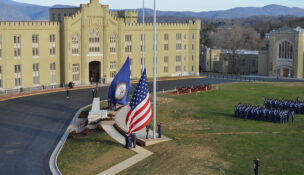
Gwenn Rosener, CEO of Fairfax County staffing firm FlexProfessionals, says job listings have declined since Donald Trump took office in January. Photo by Will Schermerhorn

Gwenn Rosener, CEO of Fairfax County staffing firm FlexProfessionals, says job listings have declined since Donald Trump took office in January. Photo by Will Schermerhorn
Federal job cuts ripple through Northern Virginia
Summary
- Trump administration plans to cut 300,000 federal jobs by 2025
- Northern Virginia home to 175,000 federal workers, most in U.S.
- Contractors freeze hiring as contracts stall, sparking layoffs
In early January, FlexProfessionals, a Fairfax-based staffing and recruiting firm, saw its job listings triple from the previous month.
Years of “fits and starts and challenges” in the wake of the global COVID-19 pandemic, rising interest rates and inflation appeared to be in the rearview, and businesses seemed buoyed by the promise of a new presidential administration.
Then, says CEO and co-founder Gwenn Rosener, “the bottom dropped out.”
As uncertainty set in over the Trump’s administration’s plans to slash federal jobs and spending, as well as impose hefty tariffs on a variety of imported goods and materials, job listings evaporated as companies “retrenched,” Rosener explains.
“They’ve told us, ‘We’re waiting. We want to understand what contracts are real now,’ because they’re still waiting for … affirmation of existing contracts. Many of them had to pivot and try to win new contracts.”
FlexProfessionals handles placements for professional roles including accounting, sales, marketing and human resources for small and mid-size businesses, including government contractors, associations and nonprofits, and has worked with about 1,000 companies over the past 15 years.
About 25% to 30% of the agency’s placements throughout the Washington, D.C., region have been with government contractors or technology firms that work with the government. That’s dropped to about 15% now, Rosener says.
Since Trump’s second term started, job placements have been suspended and hires in progress have stopped, she notes, and at the same time, the firm has seen a 10% increase in monthly registrations from job seekers from March through July, compared with the first two months of the year.
Many of these job seekers are former federal workers, Rosener notes. “What we heard from many of the government employees is that they never thought they’d ever have to go through a job search.”

Uncertain future
As the Trump administration continues to take aim at the federal civilian workforce, with plans to cut 300,000 jobs by the end of 2025, Virginia is likely to feel an outsized effect, particularly Northern Virginia.
With 321,516 federal civilian workers, the commonwealth has more federal workers than nearly every other state, trailing only California, according to the Weldon Cooper Center for Public Service at the University of Virginia. Also, Virginia ranks No. 1 in federal contract spending, with $109 billion spent in the state in 2023, 62% of which went to Northern Virginia. More than 441,000 jobs depend on that money, according to the center.
As many as 175,000 federal workers live in Northern Virginia, and more than 80,000 federal jobs are based in the region, the Northern Virginia Regional Commission reports. It’s difficult to pin down the exact number of Northern Virginia-based federal workers who have taken buyouts or been fired, but Terry Clower of George Mason University’s Center for Regional Analysis says the number hovers around 6,000, based on U.S. Bureau of Labor Statistics data.
That number may not sound like a lot, but it adds up, Clower says. “Let’s put it this way: If a company was coming to town and they told the governor they’re going to bring 6,000 jobs with them, they would be in line to get a really, really big incentive package.”
For every federal civilian job lost, another 0.4 jobs are lost because of the household spending effect, Clower says, adding that those losses can indirectly affect other areas, including commercial real estate and the housing market.
In a July survey by the Northern Virginia Chamber of Commerce and Pinkston, 23% of local business leaders reported that they had downsized operations this year, while 7% laid off employees.
Herndon-based software company Deltek, which is tracking terminated federal contracts, reported as of mid-August that more than 2,330 prime government contracts have ended this year, contributing to private sector layoffs. The state’s Virginia Works reported in August that the professional and business services sector, which includes many govcon firms, has lost the most jobs statewide, a decline of 10,900 jobs between July 2024 and July 2025. Mitre, Booz Allen Hamilton, Leidos and other big names have announced layoffs, and other businesses are encountering difficulties as well.
“It makes it tough for companies, because when you have uncertainty, they can’t invest,” says Loudoun County Economic Development Executive Director Buddy Rizer.
Loudoun lost a “major” project planned around a Metro stop by a government contractor in the spring because the company didn’t know if its contracts would be renewed, Rizer says. He declined to name the company but adds the project “would have been a game changer.”
“That’s an impact that we can’t measure, right? We can’t measure what’s not happening because of this,” he notes.
What is measurable is rising unemployment and a softening housing market, two areas that might reveal some of the early impact.
The Northern Virginia Association of Realtors noted that as of June, homes were taking an average of 20 days to sell, more than 40% longer than in June 2024, and inventory was up more than 52% from a year earlier.
Meanwhile, Virginia’s unemployment rate has increased for seven consecutive months, hitting 3.6% in July, up from 2.8% a year earlier, and 2.9% in December 2024. Each of Northern Virginia’s cities and counties have also seen increases, according to BLS.
Since February, about 1,500 federal employees and 5,100 people tied to the state’s top 500 government contractors have applied for unemployment, says state Secretary of Labor Bryan Slater.
“It warrants monitoring, and we are concerned,” he says. “That’s why we’re doing some of the things that we’re doing.”
In February, the state launched VirginiaHasJobs.com, which links to jobs boards and also offers resources for laid-off federal workers seeking new jobs. Through mid-August, the site had more than 237,000 visits, according to Slater.
Fairfax County Board of Supervisors Chair Jeff McKay has criticized the job board, as well as Gov. Glenn Youngkin’s response to the Trump administration’s actions, saying it’s not going far enough to soften potential losses for affected workers, some of whom may work in jobs that are not easily transferrable.
The county is home to about 80,000 federal employees and 120,000 contractors, and among McKay’s chief concerns is a talent drain among people who lose jobs and relocate to less expensive areas. Fewer jobs are now available, too, which McKay attributes in part to contractors pulling back on speculative openings. According to Fairfax County data, there were 26,800 jobs open in August within the county, down from 48,000 in February. That can have a ripple effect.
“I do think most companies decide where they’re going to locate or expand based on what does the talent landscape look like, and if our talent landscape is taking a hit because people are deciding to leave our region, that’s a huge long-term problem,” McKay says.
The Weldon Cooper Center’s most recent quarterly forecast, issued in August, anticipates that the statewide unemployment rate will reach 4.2% by the end of this year and 4.6% in 2026, marking the highest rate since 2021, and Virginia is expected to lose more than 22,500 jobs in the second half of the year.
Meanwhile, federal employees who took deferred buyouts earlier this year came to the end of their salaries at the end of September, and federal workforce Reddit discussions are full of stories about their challenges finding new jobs, as well as others leaving the D.C. region for work.
“I think we’re going to see more inventory coming on the market this fall, and I think it’s possible to see some price drops in local markets year-over-year, prices falling,” says Lisa Sturtevant, chief economist from Bright MLS, the multiple listing service for the mid-Atlantic region.
Building resilience
This isn’t the first time Northern Virginia has suffered job losses, notes U.S. Sen. Tim Kaine, a Democratic former governor who has criticized Youngkin’s response to federal cuts.
In 2005, the region lost about 17,000 U.S. Department of Defense personnel as part of a realignment. Arlington County and Alexandria bore the brunt of the losses, but this helped pave the way for Amazon.com’s HQ2 and the Virginia Tech Innovation Campus, Kaine says. “I’m always of the belief that we’re resilient. We’re strong. As long as we keep making investments in talent, we will both grow our own talent and attract talent.”
Regional economic development professionals have worked for years to diversify Northern Virginia’s economy, with pushes into artificial intelligence, commercial spaceflights, quantum computing and life sciences, as well as a focus on startups. Meanwhile, under Trump, federal defense spending has continued to be strong, which has helped that sector this year.
In July, the Northern Virginia Chamber of Commerce released a roadmap to revamp the region’s economy, focusing on building tech sectors, as well as providing more child care options and affordable housing.
Julie Coons, the chamber’s president and CEO, says that she’s learned from talking with other business leaders that they no longer can depend on future surges of federal dollars in the region.
“The CEOs that I talk to continue to this day to believe that we have got to seize our future,” she says. “We’ve got to plan for it. There is no time like the present. Waiting is not an option.”
Beyond the roadmap, the chamber is building an engagement council to discuss changes to draw more business to Northern Virginia, Coons says, but she expects the process to take three to five years.
Meanwhile, says Ryan Touhill, director of Arlington Economic Development, more companies in the tech, defense and aerospace industries have expressed interest in coming to the county, and there are discussions underway to potentially create an innovation district in National Landing. That could be announced later this year, Touhill says.
According to the chamber’s July survey, 68% of business owners are optimistic about their companies’ prospects through the end of this year, a feeling Gwenn Rosener shares.
While there are some struggles in her job placement firm, she’s seeing more demand for marketing, recruiting and human resources jobs, she says. “I think there’s some pent-up demand, and I think it’s going to get better.”
Northern Virginia at a Glance
- Inova Health System
- Amazon.com
- Booz Allen Hamilton
- Capital One Financial
- Freddie Mac
- General Dynamics
- Northrop Grumman
- RTX
- AES
- QXO Building Products
- (formerly Beacon Roofing Supply)
- Boeing
- Booz Allen Hamilton
- CACI International
- Capital One Financial
- DXC Technology
- Freddie Mac
- General Dynamics
- Hilton Worldwide Holdings
- Leidos Holdings
- Northrop Grumman
- NVR
- RTX
- Science Applications International Corp.
- Westfields Marriott Washington Dulles (Chantilly) 59,538 square feet of event space, 336 rooms
- Hyatt Regency Crystal City at Reagan National Airport (Arlington) 70,000 square feet of meeting space, 685 guest rooms
- Crystal Gateway Marriott (Arlington) 39,983 square feet of meeting space, 703 guest rooms
- Hilton Alexandria Mark Center (Alexandria) 37,091 square feet of event space, 428 rooms
- DoubleTree by Hilton Hotel Washington D.C. – Crystal City (Arlington) 33,316 square feet of meeting space, 627 guest rooms
- Hilton Arlington Rosslyn The Key (Rosslyn) 28,000 square feet of meeting space, 333 guest rooms
- Watermark Hotel (Fairfax County)
- Salamander Middleburg (Loudoun County)
- Lansdowne Resort (Loudoun County)
- Hotel Burg (Leesburg)
- Field and Main, Marshall – Southern, fieldandmainrestaurant.com
- Ellie Bird, Falls Church – Contemporary casual, elliebirdva.com
- Mama Chang, Fairfax – Chinese, mamachangva.com
- Ruthie’s All Day, Arlington – Mid-century modern, ruthiesallday.com
- 2941 Restaurant, Falls Church – Contemporary American, 2941.com
- Joon, Vienna – Persian, eatjoon.com


















